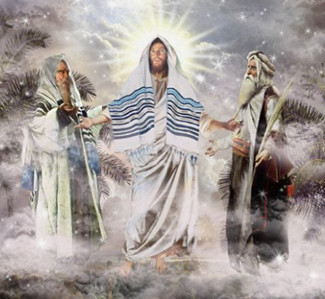Part of the theology that most of us inherited taught that our journey of faith was one of living our lives "according to God's plan", of accepting our state in life (whatever it may be) as part of His will for us, and submitting to the sometimes unreasonable demands that we seem to think He makes upon us. The soul is spirit, noble, most God-like. The flesh is lowly, corruptible, and definitely mortal. We were trained to struggle against the desires of the body, to subdue, to repress. And Lent was a special time for self-denial and sacrifice. At first glance, the readings for the Second Sunday of Lent reinforce these ideas. But if we are really attentive to the Scriptures, we find a very different message.
 In Genesis we listen to God's promise to Abraham: "I will make you a great nation, and I will bless you. Your name will be great and all shall find a blessing in you." This, of course, is the same God who just a moment before demanded that Abraham offer the life of his son in sacrifice as proof of his loyalty and faith. The Letter to the Romans reflects on the death of Jesus as a sign of God’s generosity: “God who did not spare his own Son, but handed him over for us all. ” In other words, life is not easy and we are to bear our share of hardship with the strength that comes from God. And finally, in the Gospel passage, Matthew allows us to become witnesses with Peter, James and John of the Lord's transfiguration. The Apostles witnessed a dazzling display of God's glory at the Transfiguration and were overwhelmed with excitement.
In Genesis we listen to God's promise to Abraham: "I will make you a great nation, and I will bless you. Your name will be great and all shall find a blessing in you." This, of course, is the same God who just a moment before demanded that Abraham offer the life of his son in sacrifice as proof of his loyalty and faith. The Letter to the Romans reflects on the death of Jesus as a sign of God’s generosity: “God who did not spare his own Son, but handed him over for us all. ” In other words, life is not easy and we are to bear our share of hardship with the strength that comes from God. And finally, in the Gospel passage, Matthew allows us to become witnesses with Peter, James and John of the Lord's transfiguration. The Apostles witnessed a dazzling display of God's glory at the Transfiguration and were overwhelmed with excitement.
Being a people of faith does not mean that we will always be able to find Him present in the ups and downs of our everyday lives. There are few "transfiguration events" in our lives. All of us have gone through, or are going through, moments in our lives when the absence of God seems so real that the promise of future glory means little, when the words and actions of others - no matter how well-meaning they might be - seem hollow and hypocritical, when our loneliness and emptiness lead us into the desert, with no hope of returning.
But this does not mean that we are expected to passively sit back and "accept" all of the obstacles and roadblocks we find along the way as being part of some grand plan that He has for us. Citizensip in heaven does not exempt us from the responsibilities of citizenship here on earth.
The whole point of the transfiguration story was not to go up the mountain and bask in God's glory, but to go back down the mountain and do what Jesus does: heal the sick, give sight to those who are blind, to open the ears of the deaf and to bring the Good News to the poor. The voice from the Cloud says the same thing now as that heard at Jesus' baptism: "This is my beloved Son, in whom I am well pleased." But there is now an addenda to the message, directed squarely at the disciples: "Listen to him! Listen to what He is saying, not to what YOU think he saying."
On the mountain they didn't understand the meaning behind the Transfiguration. Only when He is raised from the dead will they understand. Only then will they remember the Transfiguration. Only then will they remember that like Abraham they too are told to “Go Forth” and live the promise given them. Only then will they truly understand why He sent them down from the mountain, back to the physical world which needed to be transformed and transfigured.
Today we are challenged to transform our lives - to let the glory of God guide us and shine through us to focus on God along the hills and valleys of our journey of faith knowing that God is near, that He understands our pain, and that He will sustain us and carry us through.
We have been told to listen and to “Go forth.” Lent is a good time to reflect upon how well we do both.





